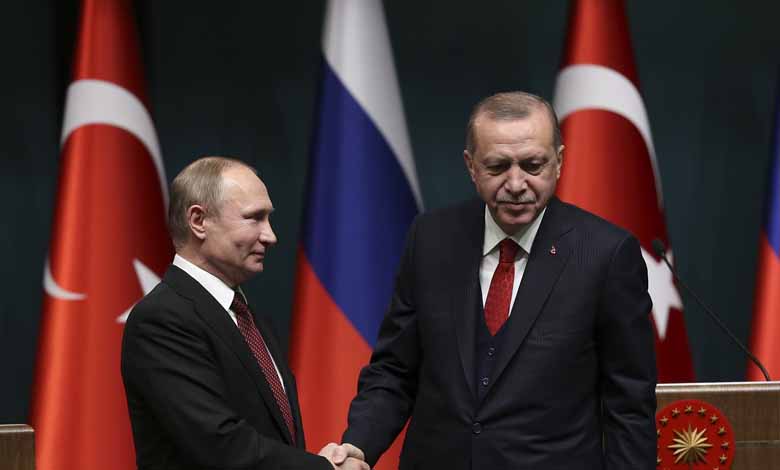Russian and Turkish leaders meeting stirs controversy over the nature of relations between them

Turkish President Recep Tayyip Erdogan headed to the Russian city of Sotchi to meet with his Russian counterpart, Vladimir Putin, in order to discuss several important issues between the two countries. The visit demonstrated a great contradiction in the Turkish-Russian relations.
During the visit, Erdogan stressed the importance of relations between the two countries to resolve the crisis in Syria, claiming that peace is linked to relations between the two countries, and that he is confident that there is great benefit to the continuation and strengthening of Turkish-Russian relations.
In contrast, Putin said that our cooperation with Turkey continues successfully on the international arena, and here I mean our positions towards both Syria and Libya, noting that his country’s cooperation with Turkey regarding the Qarabakh region is of great importance in terms of contributing to the stabilization of the ceasefire and ensuring a more durable and lasting peace in the future… Major projects with Turkey are proceeding according to the planned plan, and our investments there amounted to $6.5 billion, while Turkey’s investments there reached $1.5 billion.
The meeting was preceded by Russian forces strikes against Turkish factions in Syria a few days ago. Areas in Idleb, Hama and Latakia were targeted under the pretext of the presence of the Syrian Liberation Committee, as well as attacks on the calculated Turkish national army in the Ghosn al-Zaytoun area, which resulted in at least six deaths and other injuries, following Russian bombings on Turkish factions in the village of Barad, in the Afrin countryside north of Aleppo, and on positions in the villages of Basufan and Basselhasya in the same campaign.
Mustafa Sejari, a member of the Leadership Council of the Syrian Front for Liberation, said that the bombing is an indication of Russia’s persistence in targeting and striking Syrian national forces, a violation of understandings and agreements, and support for the terrorism of the Assad regime and the Kurdistan Workers’ Party, pointing out that it is a clear message to put pressure on Turkey before the summit.
Buying weapons for Turkey
Despite this hostility in Russia, the two countries cooperate in the political, commercial, economic and military fields, which is questionable. Turkish President Recep Tayyip Erdogan announced four days ago that his country will continue to purchase S-400 missile systems from Russia, despite American threats to impose economic sanctions.
“The agreement to supply the Russian S-400 missile defense system to Turkey was signed in December 2017 in the capital, Ankara, under which Ankara would receive a partial loan from Russia to finance the purchase of the S-400.”
“Since the system’s deliveries, which caused a crisis in relations between Turkey and the US, in mid-July 2019.”












